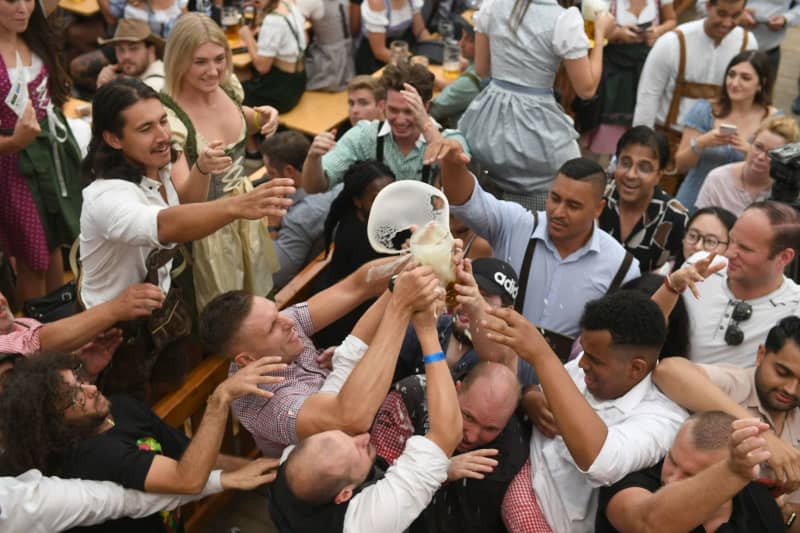Blazed in Bavaria: Oktoberfest mulls allowing joints under new laws

Beer, pretzel, bratwurst... and a joint?
Smoking weed in public is now legal in Germany as of the start of April. Does that mean a purple haze is about to descend on the world's largest beer festival?
Oktoberfest organizers in the southern state of Bavaria have been tight-lipped about what Germany’s budding cannabis culture means for this annual booze-up.
"The effects of the law on events will only become clear in a few weeks or months," a spokesman for the Department of Economic Affairs of the City of Munich said.
If new cannabis-related rules for the Volksfest become necessary, these will be reflected in the Oktoberfest ordinance, the spokesman says. The administration committee responsible for new rules said that it was not yet possible to make any judgements.
The Oktoberfest has a long history of strict rules, and weed would not be the first alternative buzz to have been killed by festival organizers.
The smell of mulled wine is ever-present at Germany's Christmas markets, and yet this drink is virtually impossible to find at the world's largest beer festival due to restrictions on drinks that could compete with the event's main draw - beer.
The local Health Ministry in the state of Bavaria is meanwhile concerned about weed being smoked in the presence of children, given that the the many rides at Oktoberfest make it popular with families.
"The consumption of cannabis in the immediate presence of minors is generally prohibited," Bavaria's Health Minister Judith Gerlach told dpa, citing the country's new relaxed drug laws. "This applies regardless of location and also applies to events and public festivals."
A stomach-turning combination
Smoking weed, if it is allowed at Germany’s Oktoberfest, could also add a new stomach-twisting dimension to an event where revellers bing drink beer by the litre near roller coaster rides.
"Studies show that cannabis increases the effects of alcohol," a ministry spokesperson said, warning of risks of thousands mixing the two at a sprawling festival.
In addition, the body's warning signals may not be recognised in time. As a result, people could consume more alcohol or cannabis than if they were to consume one intoxicant on its own, meaning more than just the usual post-Oktoberfest hangover.
What's more, the beer served at Oktoberfest, a Bavarian lager specifically brewed for the event, has a higher alcohol content than most other beers served in Germany, with up to 6% compared to around 4.8% for a Pilsner.
Drinking beer is also not cheap, and for those growing weed at home under Germany's new cannabis laws, getting stoned is likely to be the more affordable high.
Beer at Oktoberfest is served in traditional tankards that hold 1 litre and in 2023, one tankard - called Mass in German - cost a staggering €14.18 ($15.10) on average, up 6.1% from last year, in line with inflation rates in Germany.
Clemens Baumgärtner, head of business and festival organiser, is cautious about the topic of weed at Oktoberfest. "We first have to take a close look at the law," the CSU politician told German tabloid Bild. In any case, he says he has a bad feeling when imagining that joints could soon be passed around in the pub gardens at the Oktoberfest.
Those running Oktoberfest beer tents are also still uncertain about whether joints will be allowed. "We are currently in the process of forming an opinion among our colleagues," said the spokesmen for Oktoberfest landlords, Peter Inselkammer and Christian Schottenhamel, noting out that the decision to partially legalize cannabis consumption is still fresh.
Weed and cocaine already present
Behind the scenes, preparations for the festival have long been in full swing. The first tents will be raised by the beginning of July at the latest. On September 21, the beer taps are opened and the festival then lasts until October 6.
Around six million litres of beer are drunk by roughly the same number of visitors during the festival.
The festival's paramedics are mostly kept busy with injuries from falling as a result of alcoholisation. In 2023, intoxications - usually involving alcohol - accounted for 36% of all emergencies at the Oktoberfest paramedic station, which treated several thousand patients during the two weeks of the festival.
Some Oktoberfest revellers have long been smoking weed at the festival - albeit illegally. Police said they counted more than 350 drug-related offences at last year's festival. Around half of these involved cannabis, according to a spokeswoman, and the other half involved cocaine, as well as a small percentage of other narcotics.
A local police spokesperson said it was not possible to speculate to what extent the legalization of cannabis will affect the work of the police at this year's Wiesn.
Last year, 7.2 million guests came in sunny weather and drank 6.5 million litres of beer.
Until the smoke clears on the broader cultural impact of Germany's new cannabis laws, it's unclear just how many Oktoberfest visitors will be drinking beers with a joint in hand come September.

